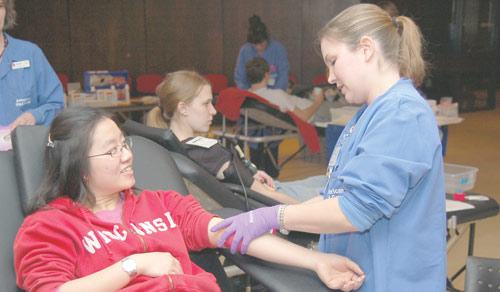During last week’s All-Campus Day of Service, there was a blood drive on the second floor of Gordan Commons. I had some spare time and some spare blood, so I decided to stop by and donate. I walked toward Gordan with a little skip in my step; I was feeling like a good, charitable person.
When I walked into the huge room, I wandered around lost and afraid for a few minutes before I found the check-in table. There, I had to wait five minutes while two bored volunteers slowly, slowly coached the girl in front of me through the sign-in process. When I finally reached the front of the table, I was informed that there were several appointments already scheduled, but the donors hadn’t shown up yet. They asked that I go wait for five minutes, and if the donors still hadn’t arrived, I could take their spot.
I sat in an uncomfortable fold-up chair and fiddled on my phone for 15 minutes, my charitable high rapidly fading. Finally, I stood up and asked the bored volunteers if I could donate. They nodded and shoved a paper at me. After signing my name, I resumed my place in my fold-up chair.
I glanced at the clock, calculating the amount of time I had before my next class. I scrolled through Pinterest, fueling myself up with inspirational quotes and cute rompers. I found out which Disney villain matches my personality on Buzzfeed.
The second hand on the clock slowly ticked.
I read three out of my 10 free New York Times articles for the month. I checked my email. I flipped through my Instagram feed.
The clock kept ticking.
When 45 minutes had passed, I shot up out of my chair and strode up to the bored volunteers. As nicely as I could — considering I wanted to strangle someone — I informed them I needed to go to class and asked they remove my name from the list. They gave me a bored look.
I stalked away from Gordans with absolutely no skip in my step — I was on a warpath. The charitable high was entirely gone, replaced by frustration, anger and a conviction that those volunteers were incompetent.
A week later, I have calmed down. I realize that donating blood is a slow process as it requires time and specific protocols to ensure safety. I understand the volunteers working the front table are often untrained students who are stressed about classes and unsure of what they’re doing. I can easily see how a blood drive could get backed up.
Still, blood drives should not be turning away donors. It should not take so long to get through the clerical work that no one has the time to actually donate.
Every two seconds, someone in the U.S. needs a blood transfusion. Approximately 40,000 pints of blood are needed in the U.S. each day. A single car accident victim may need up to 100 pints of blood. Blood cannot be artificially manufactured — it must be donated.
Blood donations are important to public health because they are necessary to save lives.
To donate, the donor must go to a blood drive, register and then complete a health history and mini physical. Next, the donor fills one pint-sized bag and several test tubes with blood. These get labeled and stored in little coolers until they are transported to a lab for testing.
The actual donation takes 10 to 15 minutes, but the entire process takes around an hour if everything runs smoothly.
I’m not arguing that blood drives should try to speed up this process, skim over the physical or skip the health history. These are all necessary precautions to ensure the safety of the donors and the patients eventually receiving the blood.
But it is unacceptable that a donor should have to wait an hour before they can even register.
Donors should feel welcome when they come to a blood drive, not like they’re an inconvenience. Before they sit down, they should be informed of approximate waiting times. They should be given a fact sheet of possible reasons that they’d be turned away from donating (for example low body weight or travel in a certain region), so they don’t wait an hour only to learn they are ineligible.
Volunteers should be fully trained to handle questions and be able to guide donors through the process. They should be friendly, proactive and helpful — not disgruntled and bored.
Blood drives are great, necessary events. It’s incredible that our campus hosts so many — our student body is an excellent source of both donors and volunteers.
But the most painful part of the donation process should be the needle prick, not the three-hour wait.
Teresa Turco ([email protected]) is a sophomore majoring in psychology and economics.





















